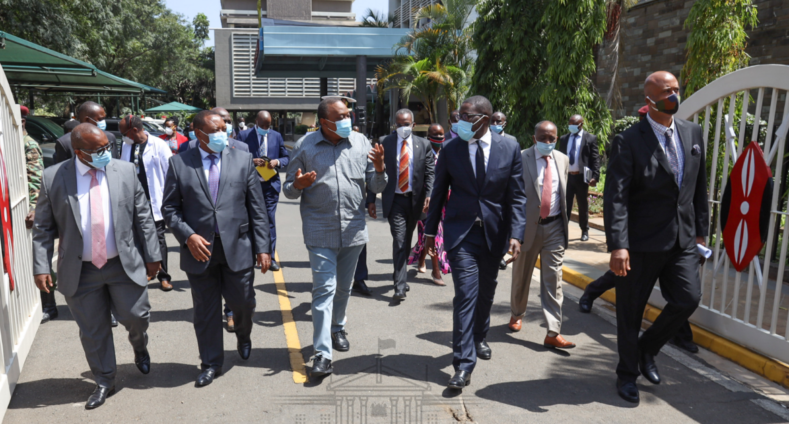Kenya’s top judge advised President Uhuru Kenyatta on Monday to dissolve the country’s male-dominated parliament, saying lawmakers had failed to meet a constitutional provision which would allow for one-third of seats to be occupied by women.
Despite Kenya’s 2010 constitution stating that no more than two-thirds of any elected or appointed body can be of the same gender, women hold 22% of seats in the country’s lower house of parliament, and 31% in the upper house.
Court rulings since 2012 have directed parliament to pass legislation to enforce the gender rule or risk being dissolved - but previous attempts have failed with female MPs accusing male lawmakers of deliberately blocking efforts.
In an advisory sent to Kenyatta, Chief Justice David Maraga said the failure to enact the legislation was clear testimony of lawmakers’ “lackadaisical attitude and conduct” in relation to the two-thirds gender rule.
“There is no doubt that the dissolution of parliament will cause inconvenience and even economic hardship. The fact that Kenya is in the midst of the coronavirus pandemic only exacerbates the potential impact of the decision,” wrote Maraga.
“Yet that is the clear result Kenyans desired for parliament’s failure to enact legislation they deemed necessary. We must forget that more often than not, there is no gain without pain.”
Presidential spokeswoman Kanze Dena told the Thomson Reuters Foundation that there was no comment on the advisory.
Some political analysts said the advisory does not compel the president to act, but women’s rights groups who have long campaigned for legislation said the move was a significant step in the fight for fairer gender representation in politics.
“We imagined it, we worked for it we made it possible,” tweeted Marilyn Kamaru from the #Weare52pc movement, a collective of activists and womens’ groups which had petitioned to have parliament dissolved three years ago.
“Whether the president dissolves parliament or illegally retains it in violation of the Constitution. It is important to remember this moment was made possible by the work of women activists, feminists & the queer community.”
Women make up only a third of the 2.5 million people employed in the formal sector, according to the Kenya National Bureau of Statistics. And while women provide 80% of Kenya’s farm labour, they own only 1% of agricultural land.
The percentage of women in Kenya’s parliament is lower than east African neighbours such as Ethiopia, South Sudan, Burundi and Rwanda, according to Inter-Parliamentary Union.
Gender experts say women in politics face a barrage of challenges, ranging from physical and sexual violence to a lack of money to fund their campaigns. Quotas, they say, help create a more level playing field and ensure their voice is represented.
Latest Stories
-
Man United settle for draw at Ipswich Town in Amorim’s first game in charge
15 mins -
GPL 2024/2025: Prince Owusu screamer earns Medeama win over Young Apsotles
19 mins -
Burning old TVs to survive in Ghana: The toxic trade in e-waste
40 mins -
Perfume boss admitted he ignored Russia sanctions
53 mins -
Wicked proves popular as opening set to be biggest for Broadway film
59 mins -
Nominee for agriculture secretary completes Trump cabinet
1 hour -
ECG urges prepaid customers to top up to last one month ahead of system upgrade
2 hours -
Three more tourists named in Laos methanol deaths
2 hours -
Betway Africa offers a once-in-a-lifetime ‘Play-on-the-Pitch’ experience at Emirates Stadium
2 hours -
The rise and fall of Matt Gaetz in 8 wild days
2 hours -
School Feeding Programme: Bono East NIB seizes smuggled rice, arrest driver
2 hours -
Dr. Razak Opoku: Despite challenges, facts and data still prove NPP is better manager of the economy than NDC
3 hours -
Seidu Agongo: On December 7, it must be peace over power
3 hours -
2024 Election will take place on December 7; ignore misleading claims – EC
3 hours -
GPL 2024/25: Asante Kotoko bounce back with win over Aduana FC
3 hours

